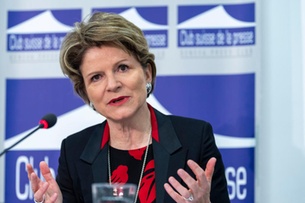Head of the Swiss State Secretariat for Economic Affairs (SECO), Marie-Gabrielle Ineichen-Fleisch, speaking in Geneva on Thursday. After some years of steady but low growth, the Swiss economy expanded by 2.5% in 2018 on the back of a positive global situation. The figures, released on Thursday by the Swiss State Secretariat for Economic Affairs (SECO), showed growth last year that was a hair below expected (+2.6%) but which still marked a jump from 2017 figures (+1.6%). Manufacturing exports were the engine, SECO said in a press statementexternal link. “The [manufacturing] sector was able to take advantage of strong international demand for Swiss industrial products,” as well as – in the first half of the year at
Topics:
Swissinfo considers the following as important: 3) Swiss Markets and News, Business, Featured, newsletter
This could be interesting, too:
Nachrichten Ticker - www.finanzen.ch writes Die Performance der Kryptowährungen in KW 9: Das hat sich bei Bitcoin, Ether & Co. getan
Nachrichten Ticker - www.finanzen.ch writes Wer verbirgt sich hinter der Ethereum-Technologie?
Martin Hartmann writes Eine Analyse nach den Lehren von Milton Friedman
Marc Chandler writes March 2025 Monthly

Head of the Swiss State Secretariat for Economic Affairs (SECO), Marie-Gabrielle Ineichen-Fleisch, speaking in Geneva on Thursday.
After some years of steady but low growth, the Swiss economy expanded by 2.5% in 2018 on the back of a positive global situation.
The figures, released on Thursday by the Swiss State Secretariat for Economic Affairs (SECO), showed growth last year that was a hair below expected (+2.6%) but which still marked a jump from 2017 figures (+1.6%).
Manufacturing exports were the engine, SECO said in a press statementexternal link.
“The [manufacturing] sector was able to take advantage of strong international demand for Swiss industrial products,” as well as – in the first half of the year at least – a weakened Swiss franc, it wrote.
The growth came largely in the first half of 2018, before following the European trend by slowing in the second. This latter easing was largely due to political uncertainty, a slowdown in the eurozone, and the steadying of the Swiss franc, UBS economist Alessandro Bee told the AWP news agency.
Household consumption and exports nevertheless rebounded slightly in November and December.
A slower outlook is forecast for 2019, with more ‘normal’ growth of +1.5% expected by the state’s economists. UBS is even more pessimistic, however: growing political and economic uncertainties, in Switzerland and Europe, may prompt them to revise downwards their expectations in the coming days.
Tags: Business,Featured,newsletter
